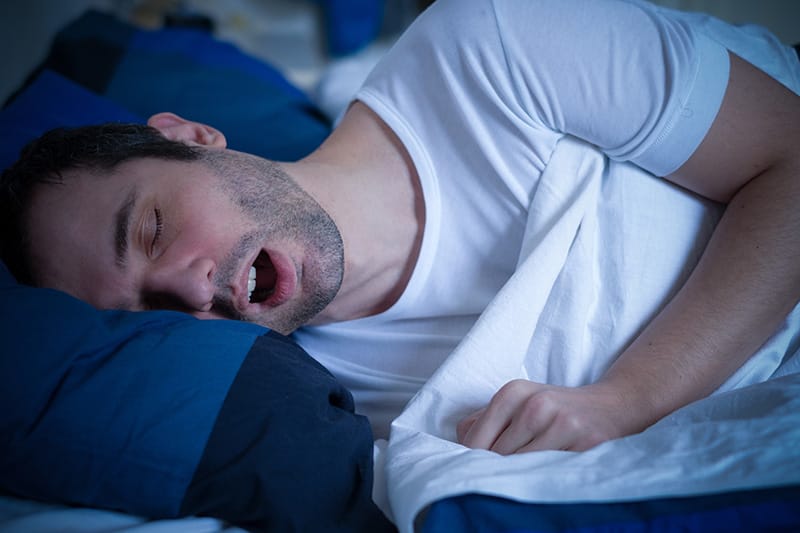Imagine sitting at your desk, going about your work, when suddenly you stop breathing. You can't control it. It just happened. For 10 seconds, you struggle for oxygen until you're finally able to breathe again.
Two minutes later, it happens again. And again and again, 30 times in an hour. How many times would it take for you to seek help?
Probably not very long. Yet this happens every night to nearly 25 million adults in the United States. Some wake up gasping for air. Others aren't even aware of what's going on and that they're secretly suffering from sleep apnea.
So what is sleep apnea?
This nightly breathing difficulty, described above, is sleep apnea, a serious and potentially life-threatening sleep disorder. It occurs when your air flow is decreased or completely blocked during sleep, so less oxygen is getting into your lungs.
There are two types of sleep apnea. Obstructive sleep apnea is the most common. It happens when your upper airways — your nose, throat, and nasal passages — are obstructed. Central sleep apnea, where there is no obstruction but the brain is failing to initiate a breath, is less common.
Left untreated, both types can slowly degrade your health.
“To varying degrees, it’s just breathing difficulties during sleep. This can result in not getting restful sleep or frequently waking up from sleep,” says Tyler Bertroche, MD, an ENT surgeon and sleep expert at The Iowa Clinic West Lakes Sleep Center. “That ultimately leads to a lot of stress on the body, heart and lungs — all night, every night. And then can carry over to problems during the day.”
What causes sleep apnea?
Men are much more likely to suffer from sleep apnea than women, especially after reaching middle age. But a lot of the risk factors have to do with your body and anatomy. Anything that restricts your airways can cause sleep apnea.
“That can be in the nose, things as simple as a deviated septum or congestion and swelling that prevents air from getting to the nose,” Dr. Bertroche says. “It could be something in the back of your throat like enlarged tonsils or the size and positioning of your tongue or soft palate.”
Body size can be a cause of sleep apnea as well. Being overweight or obese is the leading cause of obstructive sleep apnea. Pressure from the added weight on your upper chest and neck cause breathing issues when you lie down. One study in the Journal of the American Medical Association found that just a 10% gain in weight increases your risk of developing sleep apnea sixfold.
Other causes of sleep apnea like smoking, the sedative effects of alcohol and some medications, family history — even just regularly sleeping on your back — can lead to blockages that cause obstructive sleep apnea.
How can you tell if you have sleep apnea?
You don't know what you do when you're asleep. But your spouse or another family member probably does.
That's how most people learn they have sleep apnea. They're told that they snore heavily, choke, sleep with their mouth open, gasp for air or are restless sleepers.
If you don’t rest your head next to someone else, there are many signs of sleep apnea that you may notice affecting you day and night.
Symptoms of Sleep Apnea
“It can be a lot of different things. Fatigue. A headache when waking up in the morning. Dozing off when you’re in the car or in a dark room watching a movie. All those things can be symptoms of sleep apnea,” Dr. Bertroche says.
These signs can easily be written off as other things or chalked up to just one bad night’s sleep. But if you experience any of these symptoms often, they could be the result of sleep apnea:
- Sore or dry throat and headaches in the morning
- Sleepiness during the day or while driving
- Forgetfulness
- Mood swings
- Low libido
- Insomnia
“Even a slight reduction in the amount of airflow you get for a period of time can be sleep apnea,” Dr. Bertroche says. “Your oxygen content decreases and that results in you not getting restful sleep, and ultimately leads to problems during the day where you just don’t feel well or are tired all the time.”
Why is sleep apnea dangerous?
It's always dangerous if you can't breathe. But long-term sleep apnea is linked to a number of serious health problems.
“Having a couple bad nights of sleep isn’t going to change much in the long term. But sleep apnea is something that kind of whittles away on you over years and decades,” says Dr. Bertroche.
“If you’re not getting the oxygen and rest that you need, it puts a lot of strain on the heart and cardiovascular system. Heart disease, stroke, diabetes and all these chronic illnesses can slowly come to the forefront.”
When you’re not breathing, your blood pressure goes up. Your brain then alerts your blood vessels to tighten up to increase the flow of oxygen. Once you’re awake, those problems can persist and cause high blood pressure, which leads to many other serious heart problems.
And in a vicious cycle, the problems that cause sleep apnea can just further exacerbate the issue. When you’re lacking quality sleep, you might feel too tired to exercise. Or you may try to increase your energy levels by eating. Sleep deprivation also disrupts the hormones that control appetite, making you hungrier than if you were getting good rest.
“People get into this spiral. They want to get in shape and they want to feel better, but they don’t feel good when they wake up in the morning. They’re tired so they’re not as motivated to get up or do the things they need to do,” Dr. Bertroche says.
Sleep apnea treatment options
Treating obstructive sleep apnea is pretty easy and the improvements in sleep can be dramatic. Weight loss is often the first step for patients, especially in mild cases of sleep apnea. Other lifestyle changes can help too. Sleeping on your back increases the pressure on your lungs and restricts your airways, so changing sleeping positions can improve your breathing. Smoking causes swelling in the upper airways and makes sleep apnea worse. Quitting is always a good idea.
PAP machines are traditionally the answer to treat sleep apnea. Both continuous positive airway pressure (CPAP) machines and bi-level positive airway pressure (BiPAP) machines push air into your mouth and nose to help keep your airways open while you sleep. They are connected to masks — either a nasal mask or full face mask — so you have a constant stream of oxygen.
If you can get comfortable wearing the device, your sleep can change drastically. You’ll no longer snore, suffer from breathing pauses, choke or wake up gasping for air. Your daytime symptoms will subside too.
“Most procedures for sleep apnea are outpatient procedures where you come in for surgery that day and go home afterwards,” Dr. Bertroche says. “So they are pretty convenient in that regard and can be helpful in treating sleep apnea as well.”
Not everybody’s comfortable with a device, no matter how small, on their face while they sleep. So they still struggle with sleep and may choose to ditch their PAP machine altogether.
If you’re not comfortable with a PAP device, you’re not left to suffer with sleep apnea. The CPAP alternative is Inspire Sleep Therapy, which is an implanted device that functions as a CPAP inside your body.
Inside or outside, sleep apnea devices can resolve your symptoms and improve the quality of your sleep. They also lower your blood pressure at night and in the day, decreasing your risk for all the dangerous health issues down the road.
“If you get a hold of it early on, then it’s easier to turn those things around so that long term, you sleep better and are healthier overall,” Dr. Bertroche says.
So if you’ve noticed any signs of sleep apnea or are just notorious in your family for snoring or breathing with your mouth open as you catch your Zs, schedule a sleep study to get started on your journey to restful slumber and well-rested days.


